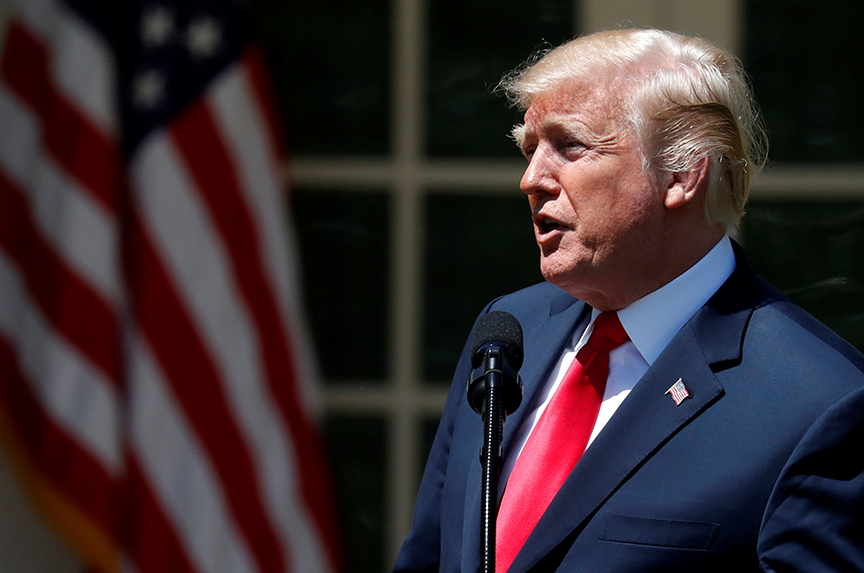 The evening US President Donald J. Trump took the United States out of Joint Comprehensive Plan of Action (JCPOA), it smelled in Israel as if war was coming. Prime Minister Benjamin Netanyahu cut short a trip to Cyprus. His Chief of Staff canceled his speech in the prestigious Herzliya conference. A few minutes before President Trump began his remarks, the Israel Defense Forces ordered residents of the Golan Heights (a northern region bordering Syria to brace for a possible attack from Syria, due to “abnormal movements of Iranian forces in Syria.” CNN reported that American officials had similar concerns and the State Department issued a travel advisory for the Golan Heights.
The evening US President Donald J. Trump took the United States out of Joint Comprehensive Plan of Action (JCPOA), it smelled in Israel as if war was coming. Prime Minister Benjamin Netanyahu cut short a trip to Cyprus. His Chief of Staff canceled his speech in the prestigious Herzliya conference. A few minutes before President Trump began his remarks, the Israel Defense Forces ordered residents of the Golan Heights (a northern region bordering Syria to brace for a possible attack from Syria, due to “abnormal movements of Iranian forces in Syria.” CNN reported that American officials had similar concerns and the State Department issued a travel advisory for the Golan Heights.
Shortly after the president’s speech, Israeli planes launched what seemed to be a pre-emptive strike against an Iranian missile site located in a military base in southern Syria. The following day, Iranian forces fired a barrage of rockets on Israeli posts in the Golan. Israel retaliated (or rather, used the opportunity) to conduct a massive air raid on dozens of Syrian and Iranian targets in Syria.
President Trump’s speech added to the sense of crisis in Israel. Conceptually, Israelis felt Trump adopted their world view, highlighting Iran’s destructive role in the region. More deeply, he justified traditional Israeli distrust of achieving security through multinational diplomacy, reinforcing the Israeli belief that security is most effectively attained though unilateral displays of force.
President Trump’s harsh words for Iran surely also affected Israeli strategists’ calculus. Obama administration pressure contributed to the Israeli decision not to attack Iran in 2009-2012. It is hard to believe that the Trump administration would be hostile to a more aggressive Israeli approach towards Iran. Moreover, if the President’s decision leads to the JCPOA’s collapse, Iran may resume the military aspects of its nuclear program, which the agreement had thus far seemed to halt. This too will increase the chance of an Israeli attack.
President Trump’s speech also strengthened Prime Minister Netanyahu’s position, having advocated a military attack on Iran in the past. Not only does it appear to Israelis that the US president shares Netanyahu’s views about Iran (unlike President Obama), but also that Netanyahu was tightly coordinated with and able to affect the American position. After all, one of the few pieces of evidence President Trump cited as justification to withdraw from the JCPOA was Netanyahu’s recently publicized presentation with revelations about Iran’s nuclear program. Moreover, Trump’s speech seemed to vindicate Netanyahu’s risky choice in 2015 to publically clash with President Obama over the deal before it was signed.
Indeed, polling conducted after Trump’s speech gave Netanyahu’s party, Likud, its greatest lead in the past decade, even as Netanyahu is being investigated in four separate cases of corruption. The prime minister’s image shifted from a hedonistic leader reliant on fomenting internal tensions in Israeli society – while facing a possible indictment – to that of a political leader of global scale. Even the fiery member of the Opposition, Labor’s Eitan Kabel, stated, “hat’s off to Netanyahu…his fingerprints are all over” Trump’s decision.
Finally, it seems that the speech tilted the internal balance in Israel (and perhaps in the US) in favor of populist elected politicians, and away from cautious national security officials. The national security establishment seemed to prefer that the JCPOA be preserved. Just before the President’s speech, General (Ret.) Amos Gilad, a former senior intelligence officer and senior ministry of defense official, stated that, without a clear alternative, the JCPOA should be kept. The former head of Israel’s Atomic Energy Agency, retired Admiral Shaul Horev, voiced a similar concern. Yet, the bold and marketing-style approach of Netanyahu and Trump seems to be more popular than the warnings of old generals and admirals, for the moment. It remains to be seen if this balance will remain tilted towards the populists when the bombs start falling.
Ehud (Udi) Eiran is an Assistant Professor at the University of Haifa, Israel, and a board member at Mitvim, The Israeli Institute for Regional Foreign Policies. Follow him on Twitter: @EhudEiran
Image: US President Donald J. Trump wrote in an April 8 tweet in response to an alleged chemical weapons attack in Syria that Bashar Assad’s regime will be made to pay a “big price” for the attack. (Reuters/Carlos Barria)
